
In 2017, while the Correctional Services Department (CSD) faced various challenges, in pursuance of the responsibilities and powers vested in law, correctional officers are committed to ensuring a secure, safe, humane, decent and healthy custodial environment at all times.
Moreover, the CSD, in collaboration with various community stakeholders, creates rehabilitation opportunities to enable persons in custody to re-integrate into society upon release. Furthermore, the department promotes law-abiding and inclusive values through community education with a view to preventing crime.
The average daily penal population at correctional facilities in 2017 was 8 529 persons, which is similar to the figure for 2016. The average occupancy rate was 75 per cent. Among the penal population, (i) 80 per cent were males and 20 per cent were females; (ii) 80 per cent were sentenced persons and 20 per cent were remands; (iii) 95 per cent were aged 21 or above and 5 per cent were aged under 21; and (iv) 3 per cent were aged 65 or above.
As at December 31, 2017, more than 10 000 persons were under the management of the CSD, including 8 423 persons in custody and 1 723 supervisees under statutory supervision after release.
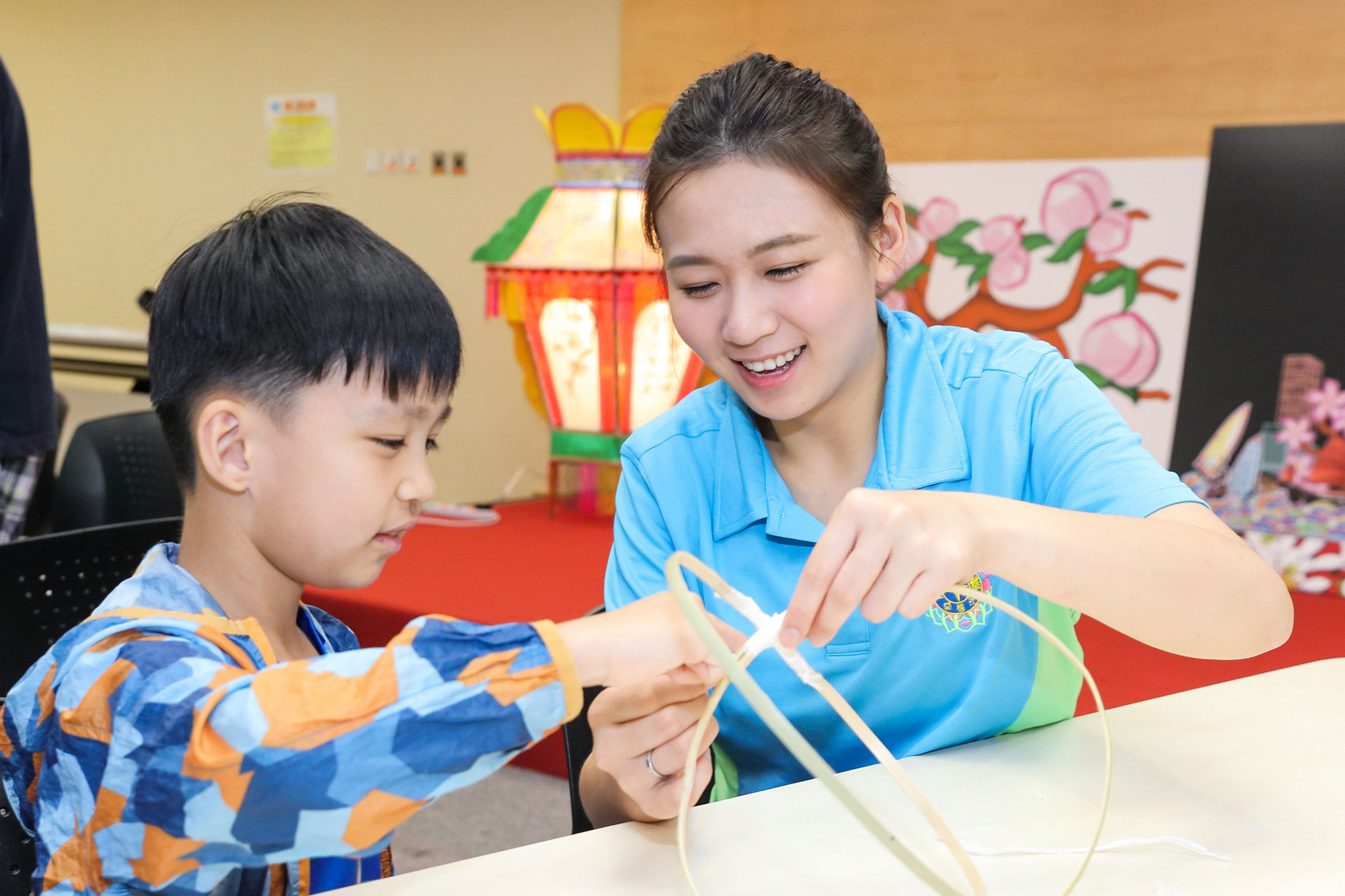 Volunteer of Oi Kwan Volunteer Group makes lantern with a patient of the Department of Paediatrics of Queen Mary Hospital.
Volunteer of Oi Kwan Volunteer Group makes lantern with a patient of the Department of Paediatrics of Queen Mary Hospital.
 Correctional staff take part in the Autumn Fair.
Correctional staff take part in the Autumn Fair.
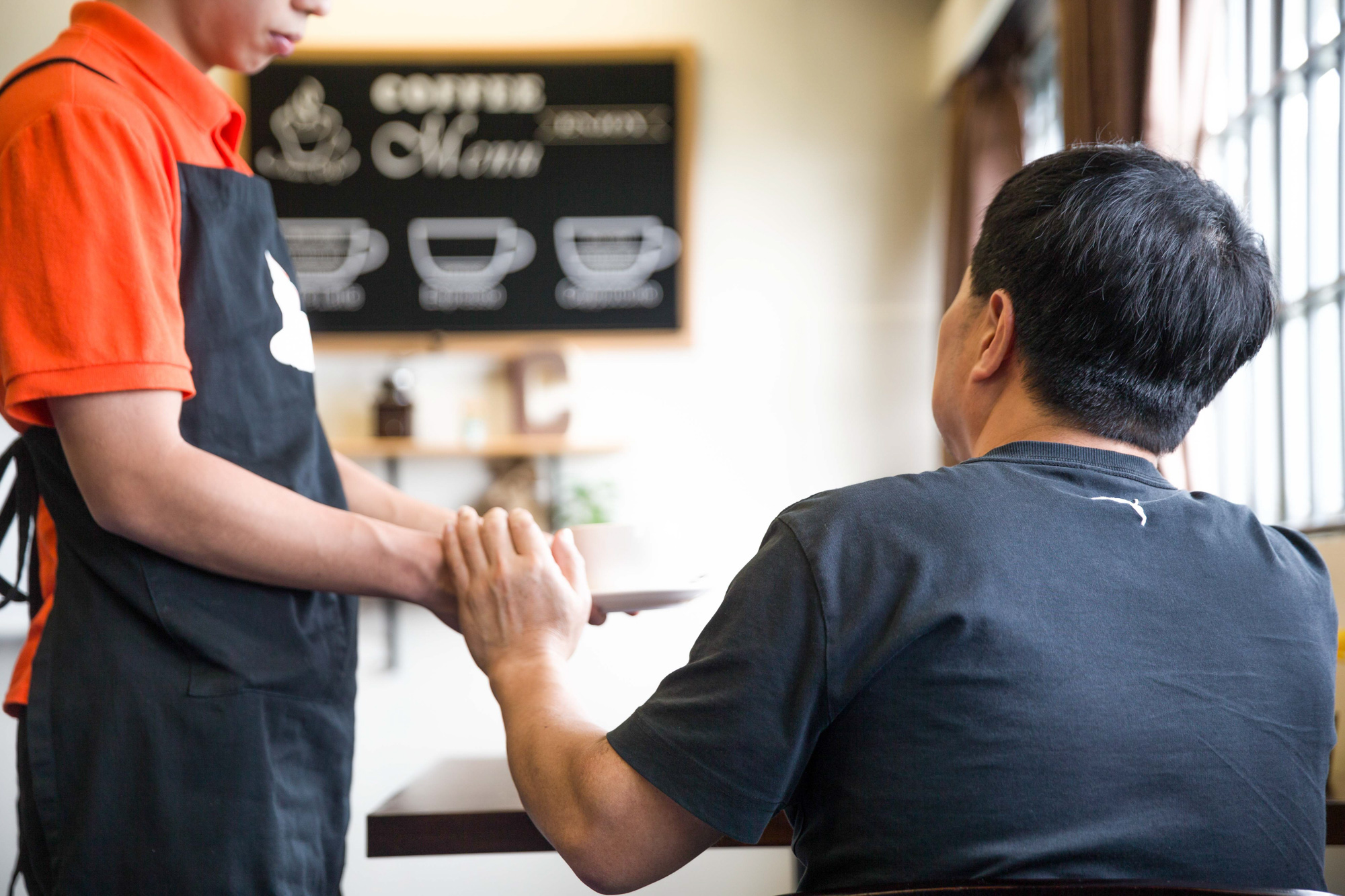 A person in custody makes a cup of coffee for his father on Father’s Day to convey his gratitude.
A person in custody makes a cup of coffee for his father on Father’s Day to convey his gratitude.
 A Correctional Officer and a guard dog in a photo with visitors of the celebration event for the 35th
Anniversary of renaming Prisons Department as Correctional Services Department.
A Correctional Officer and a guard dog in a photo with visitors of the celebration event for the 35th
Anniversary of renaming Prisons Department as Correctional Services Department.
Safe Custody
It is our duty to provide a safe and secure custodial environment and to help persons in custody rehabilitate and re-integrate into society. Although most persons in custody conform to order and discipline and show a sense of remorse, some commit acts of indiscipline. These affect adversely the order of institutions and the safety of others.
In recent years, there were large-scale prison riots or escapes in some countries or places in the world, causing deaths and injuries and severely threatening public safety. To prevent such occurrences, we review and strengthen preventive measures, contingency plans and staff equipment from time to time so as to curb all acts of illicit activities.
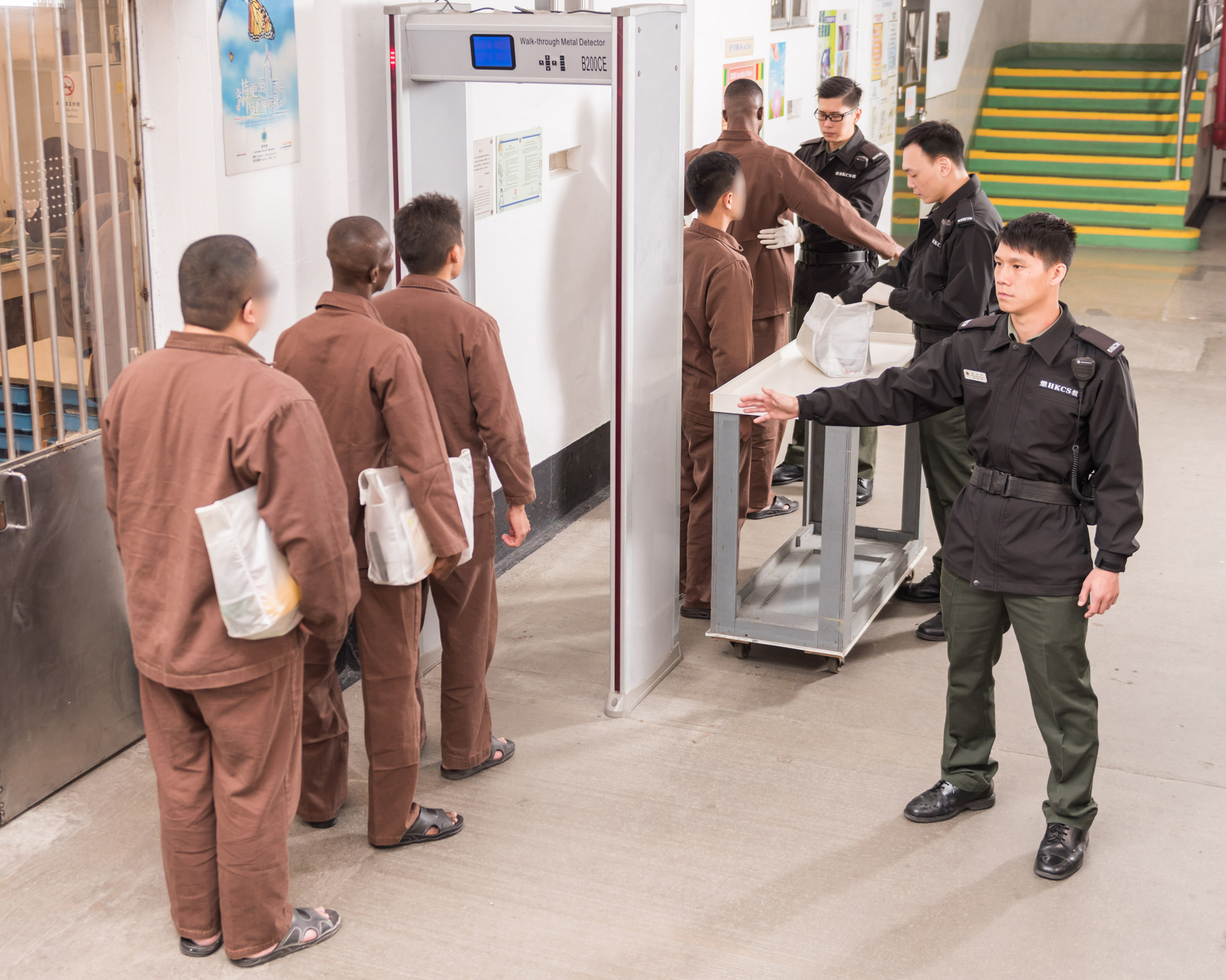 Correctional officers conduct security check on persons in custody for the purpose of ensuring a
safe custodial environment.
Correctional officers conduct security check on persons in custody for the purpose of ensuring a
safe custodial environment.
There has been no successful escape case for 10 years in a row, from 2008 to 2017. Last year, although there was one attempt, it was stopped by correctional officers instantly. On the other hand, the acts of indiscipline in correctional institutions continued to rise, particularly among persons in custody with a history of drug abuse. We will take all feasible measures to crack down on all illicit activities in institutions. In 2017, the CSD conducted 7 692 joint searching/special searching/night raid operations in institutions, covering 11 911 locations. In 2017, there were five cases of concerted acts of indiscipline, a decrease of three cases compared to 2016. These included fighting and inciting other persons in custody to get involved in collective actions, such as refusing to eat or preventing correctional officers from entering the dormitory to enforce the law.
As for cases involving violence, a total of 546 cases were recorded in 2017, which mainly involved fighting among persons in custody and assaulting others including correctional officers. It represented an increase of 19 cases from 527 cases in 2016. In 2017, there were eight cases involving correctional officers being assaulted during the course of duty, representing a decrease of 10 cases from the number in 2016. The number of correctional officers injured on duty also decreased from 21 persons to 6 persons, i.e. 15 persons less. Most of the injuries were relatively minor.
With X-ray body scanners as well as a monitoring system and intelligence network, the CSD has effectively stopped the smuggling of drugs into correctional institutions. In 2017, there were 30 cases of seized drugs, representing a 25 per cent decrease from 40 cases in 2016.
Over the years, the numbers relating to medical escort duties have remained high, causing tremendous pressure on security risks and human resources. Manpower deployed for medical escort duties amounted to approximately 39 000 man-days on average each year between 2014 and 2016, while the number rose to 41 091 man-days in 2017.
The CSD has all along explored with relevant organisations different proposals to reduce the inconvenience caused to the public when persons in custody attend medical appointments at outside hospitals. For example, as early as June 2014, the CSD conducted a research study with Castle Peak Hospital under the Hospital Authority. The psychiatrists at Castle Peak Hospital used video conferencing systems to provide a medical consultation service for persons in custody inside correctional institutions. The persons in custody concerned were kept under stable conditions and participation in the study was voluntary.
The first phase of the study was concluded in May 2016 with promising results. A total of 172 psychiatric telemedicine consultations were provided for 86 persons in custody. The study has been extended for two years to collect more data to provide the basis for full implementation in the future. In April 2017, the collaboration scheme was extended to the West Kowloon Psychiatric Centre. Following on from Lai Chi Kok Reception Centre, telemedicine consultation facilities have also been installed in Tai Lam Centre for Women, Lo Wu Correctional Institution and Hei Ling Chau Addiction Treatment Centre. As at the end of 2017, 371 psychiatric telemedicine consultations were provided to a total of 192 persons in custody inside correctional institutions. The CSD is also actively exploring the possibility of providing dermatological telemedicine consultations with the Social Hygiene Service under the Department of Health.
Rehabilitation Work
The CSD has been fostering closer partnerships with different community stakeholders, including 18 District Fight Crime Committees, charitable organisations, non-governmental organisations, the business sector and universities. Through diversified programmes and activities, the CSD seeks to enhance various sectors' support for rehabilitation work and help persons in custody re-integrate into society after release.
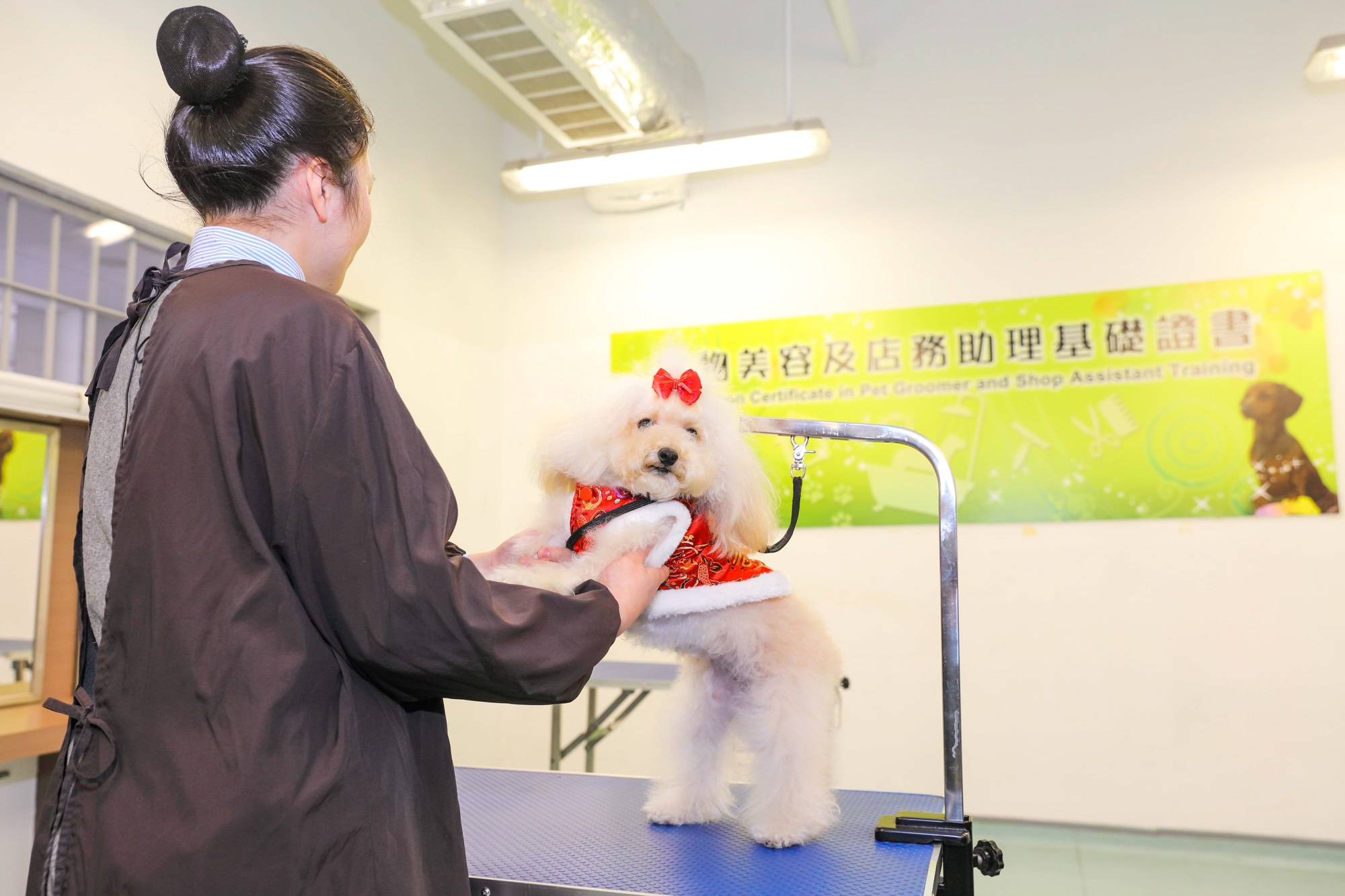 Foundation Certificate Course for Pet Groomer and Shop Assistant Training Course enhances the
employability of the persons in custody.
Foundation Certificate Course for Pet Groomer and Shop Assistant Training Course enhances the
employability of the persons in custody.
 The CSD organises Student Forum to enable rehabilitated offender to share his experience to students.
The CSD organises Student Forum to enable rehabilitated offender to share his experience to students.
The CSD arranges for convicted adult persons in custody to engage in work according to statutory provisions. The introduction of computerised production facilities, such as graphic design software, digital cutting machines and international standard testing equipment, not only boosts productivity but also enables them to acquire up-to-date skills and common knowledge, such as regulations on quality management and occupational safety and health. Such skills and knowledge will enhance their employability in different sectors in future to facilitate re-integration into society.
In terms of vocational training, all courses are organised by various local training bodies, and have attained the Qualifications Framework level or are accredited by professional bodies, thus enabling rehabilitated persons to work or enrol in bridging or progressive courses in future.
In 2017, the passing rate of vocational training examinations was 97.4 per cent, 99.1 per cent and 93.7 per cent for adult and young persons in custody, respectively. Their employment rates after six months of employment follow-up period upon release were respectively 79.7 per cent and 90 per cent. On education, the overall passing rate in public examinations was 66.1 per cent, 61.2 per cent and 72 per cent for adult and young persons in custody, respectively. Among them, two persons in custody attained Level 5 in the subject of economics under the Hong Kong Diploma of Secondary Education Examination. One of them obtained 21 marks overall in six papers, and was successfully admitted to a bachelor's degree programme. Moreover, six persons in custody were awarded bachelor's degrees and two adult persons in custody were awarded master's degrees. The number of persons in custody attaining degrees reached the highest ever level last year.
On community education, the CSD disseminates to young people, especially students, the importance of leading a law-abiding and drug-free life as well as supporting rehabilitation through the Rehabilitation Pioneer Project, which among others, includes a programme named "The Reflective Path". In 2017, the attendance was over 39 000, including young people and other participants in various activities. The programmes were well received with positive responses.
The CSD plans to form a team of Rehabilitation Pioneer Leaders this year for young people with leadership potential. The objective is to help them broaden horizons and develop their potential through diversified training programmes. They will also be encouraged to actively contribute to society in future by helping to promote law-abiding values and support for offender rehabilitation for a better Hong Kong.
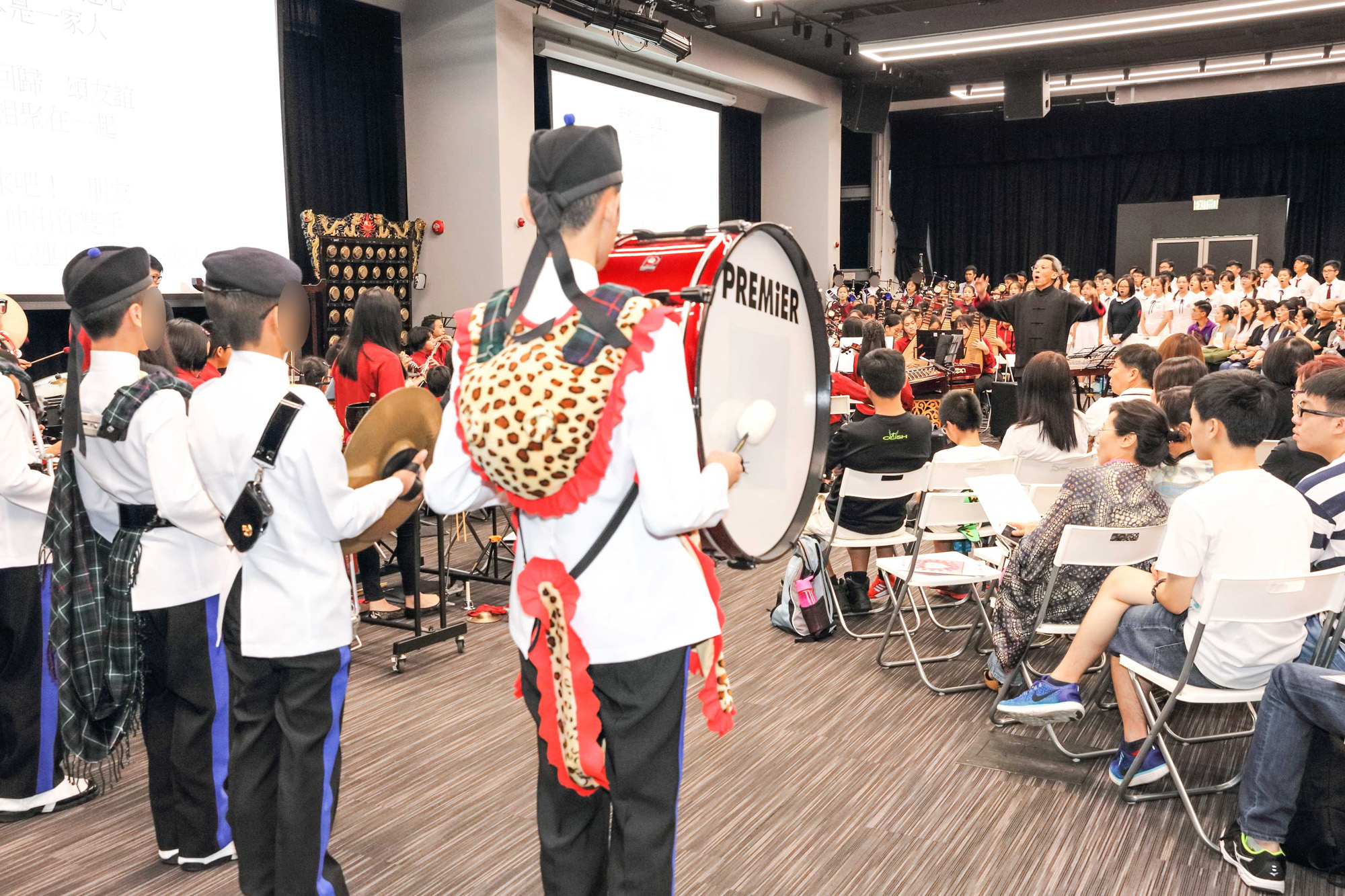 The Marching Band of Cape Collinson Correctional Institution and the Music for Our Young Foundation
held two concerts jointly on July 1 to celebrate the 20th Anniversary of the establishment of the HKSAR.
The Marching Band of Cape Collinson Correctional Institution and the Music for Our Young Foundation
held two concerts jointly on July 1 to celebrate the 20th Anniversary of the establishment of the HKSAR.
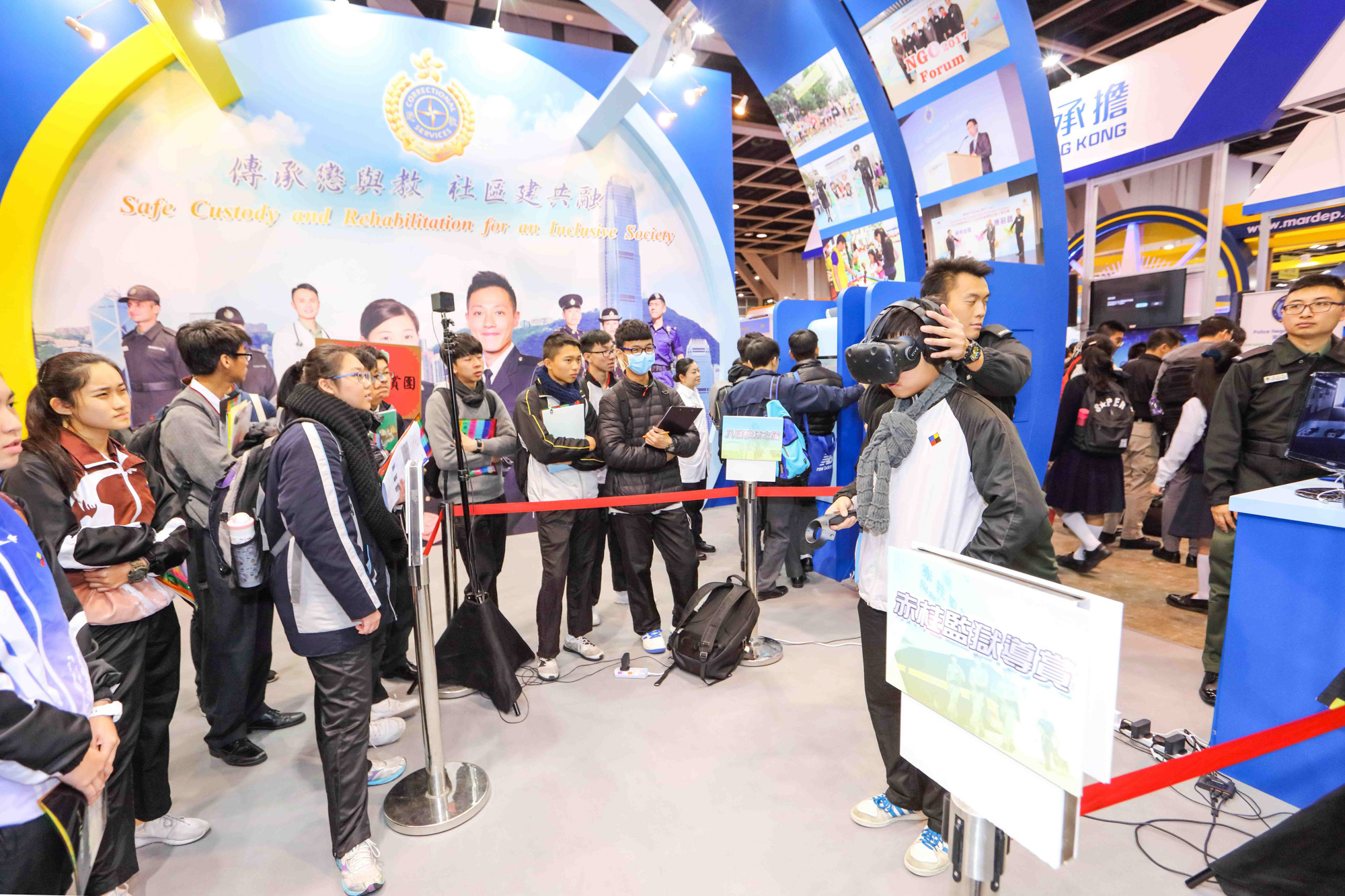 The Department’s booth in the Education and Careers Expo attracts many students.
The Department’s booth in the Education and Careers Expo attracts many students.
 The Education Unit officer assists persons in custody to prepare for the Hong Kong Diploma of Secondary
Education Examination.
The Education Unit officer assists persons in custody to prepare for the Hong Kong Diploma of Secondary
Education Examination.
